Pre-Katrina New Orleans graduation numbers are charter school advocates' exhibit A for reform. One problem: the U.S. and Louisiana Departments of Education say they don't exist.
Update June 14, 2015… Louisiana Department of Education allegedly updated their pre Katrina numbers in a High School Performance [PDF] but you’ll notice still no methodology. Also, again, they conflate the 2003-04 school year with the 2004-05 school year. More laundering.
We’ve heard the narrative so many times we know it by heart. “Results-based” charter schools “turned around” a “broken education system” using “accountability” and “data” to “rescue” it from the clutches of “failed school boards” and the dreaded teachers’ unions. No city in America better illustrating this trope than Katrina-ravaged New Orleans; with its clear before and after division of charter and “traditional” eras, it was the A-B tested anecdote the pundit classes loved to cite. It’s no surprise then that when seeking a statistic to support this axiom as part of the recently revitalized debate on charter schools, otherwise careful media outlets like the Christian Science Monitor, the Atlantic and Vox.com cited, without question, NOLA.com’s 2013 claim that the graduation rate for New Orleans improved from 54.4% in 2004 to 77.8 in 2012.

After all, it was vaguely consistent with concurrent media reports, namely the 2013 60 Minutes New Orleans “Turn Around School” infomercial by Scott Pelley.
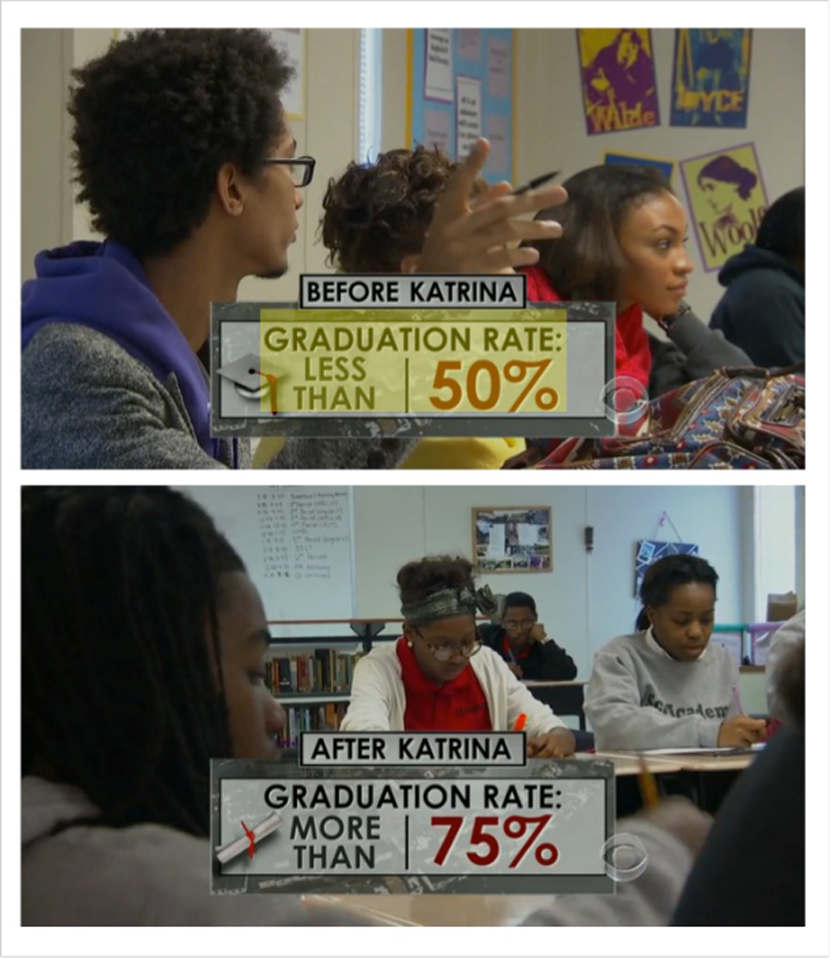
This stat said it all – a roughly 50% increase in high school graduations from before to after Katrina. Liberal, conservative, whatever – the data was in. Serious People™ knew charter schools got results. There’s only one problem:
Pre-Katrina Graduation Rates For New Orleans Don’t Exist.
The reality is that no one – including the journalist who first cited the figure – knows where the pre-Katrina graduation statistic came from. Official government figures on New Orleans graduation rates from both state and federal Department of Education sources are nonexistent, lost either in the wake of Katrina or at some point during the many incarnations of Louisiana’s Department of Education. In this post I attempt to trace the origins of this trope, how it spread unquestioned, and why a dystopian vision of pre-Katrina New Orleans is so essential to the broader “school reform” value proposition.
Before The Fall
A thought experiment:
Imagine, for a moment, that Secretary of Defense Donald Rumsfeld had said five years after 9/11:
“I think the best thing that happened to the defense system in New York and Washington was 9/11. That defense system was a disaster, and it took 9/11 to wake up the community to say that ‘we have to do better’.”
We would rightfully find this crude and opportunistic. But in 2010 when Secretary of Education Arne Duncan said
“I think the best thing that happened to the education system in New Orleans was Hurricane Katrina. That education system was a disaster, and it took Hurricane Katrina to wake up the community to say that ‘we have to do better’.”
the media either shrugged it off or embraced its thesis. The political and moral rot of the New Orleans education system pre-Katrina wasn’t just taken for granted – our political classes saw it as so manifestly depraved and corrupt that it validated the deaths of 1,833 people. Such is the hysteria with which conventional wisdom cements itself. Like a tale out of an Ayn Rand variation of Genesis, the story of Katrina wasn’t one of nature’s caprice or racism’s legacy, it was instead the fortunate and righteous correction of liberal excess. And though graduation rates are not the only point of comparison used to prop up this perception (I will explore others later), they are the most accessible and finite.
So Where Did The “54.4% Graduation Rate” Figure Originate?
The first mention of the 54.4% graduation rate came from NOLA.com’s Danielle Dreilinger in an April 2013 article highlighting Governor Jindal’s latest graduation figures:
“The school districts in New Orleans beat the state average with 77.8 percent, a staggering 25 percentage points above the 2004 rate, when only 54.4 percent of students graduated from high school.”
Governor Jindal himself then mentioned it five months later in an op-ed for the same website:
“Right before Katrina, during the 2004-2005 school year, New Orleans had a graduation rate of 54.4 percent. The graduation rate for New Orleans is now 77.8 percent”
That Ms. Dreilinger cited the number in reference to the 2003-2004 school year, whereas the Governor did so in reference to the 2004-2005 school year was certainly the most troubling of red flags. Given this, and the fact that the statistic was now canonical conventional wisdom, I asked Ms. Dreilinger whence it came:
At first she responded by citing a couple non-sequitur urls:
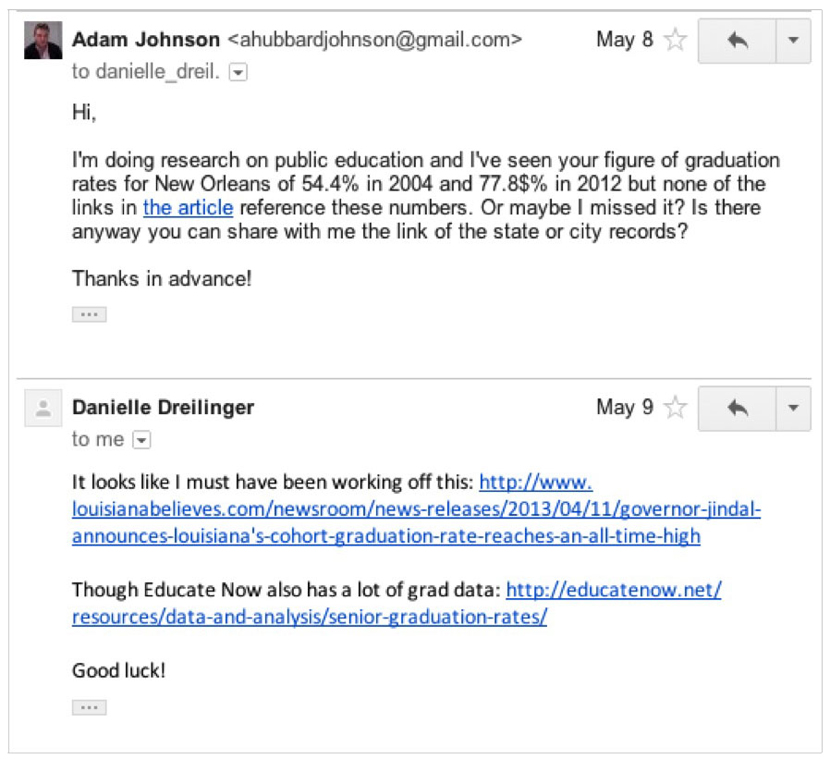
A press release and a nonprofit site with some PDFs. Neither of which had anything to with anything. Unsatisfied, I pestered a bit, eventually getting her to concede that she couldn’t “track back” where she got “the 2004 stat.”

But, she assured me again and again, Educate Now! had the answer:

Who is Educate Now!, and why is the local press referencing them, rather than the Louisiana Department of Education or the city of New Orleans, as an authority on New Orleans graduation rates?
The answer to this question illuminates, in a limited but potent way, what a corporate coup looks like up close. When education becomes charity rather than a right, an investment instrument rather than a civic good, the ability to distinguish between substance and marketing becomes by design, overwhelming. Like a refund department with a six hour wait time, the frustration in attempting to navigate this neoliberal maze of “private/public” responsibilities is precisely the point. Even the most basic of acts – hosting a website – turns out to be one of the primary reasons finding data is so difficult. The LDOE has had, inexplicably, five differnt primary domains in the past decade – from doe.louisiana.gov to doe.state.la.us to louisianaschools.net to louisianabelieves.net to its current, full-flown corporate iteration louisianabelieves.com. It’s the kind of shell game that renders one so dizzy, that when asked, as Ms. Dreilinger was, for one specific data point, the response “I get bits of data from different spreadsheets” somehow makes sense.
“Educate Now!” Why Are You Yelling?
Founded in 2008 by long time charter school advocate. ex-state Recovery Board member and ex-insurance kingpin Leslie Jacobs and her husband/recent patronage member of Mayor Landrieu’s inner network Scott Jacobs, Educate Now! is a “nonprofit” geared towards the distinctly familiar combination of advocacy, analysis, and data aggregation one would expect from any Washington think tank.
Though NOLA.com would almost certainly dismiss as bias a Louisiana Federation of Teachers funded data center, one created by a long time advocate and charter school founder wasn’t just a reliable source, it was now New Orleans’s go-to authority on all things education. That their headquarters, according to IRS documents, were simply the couple’s tasteful million-dollar home on Charles Ave wasn’t important. That their entire stream of funding, also according to IRS documents, came from only themselves was unimportant. What was important was that they had a website with numbers and charts, and this website had an obligatory smiling black kid and a kickass bio page and a blog. The fact that it was run, entirely without oversight, out of the spare bedroom of two noted partisans seemed immaterial. I was desperate for the 54.4% graduation figure, and I didn’t care who could source it.
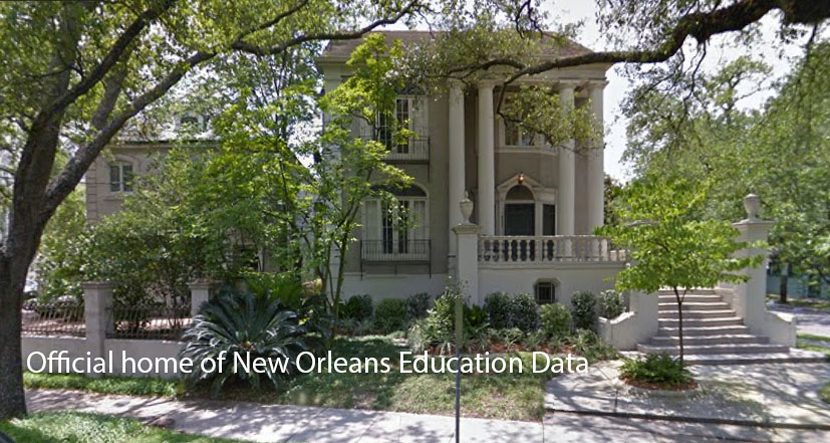
Ms. Jacobs’s answer, however, was less than satisfactory. After her @educatenow.net address bounced back twice, I tried the general info address and she responded via outlook:
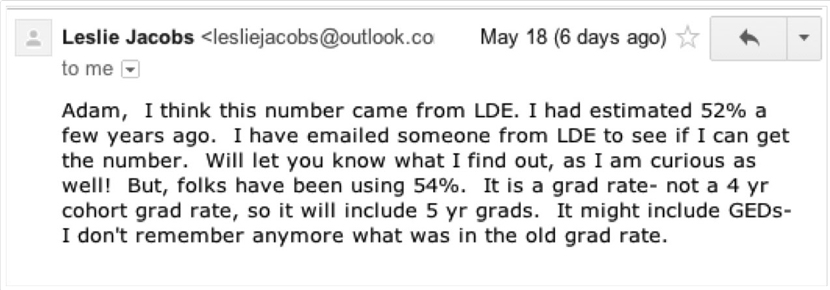
“I Think”
“I Estimated”
“I Don’t Remember.”
“Folks Have Been Using 54%.”
Like some kind of PR folklore, low graduation rates pre-Katrina just were. Passed down from marketing hack to marketing hack, the internet had allowed for a kind of oral history that was good enough for Ms. Jacobs and Nola.com, and thus everyone else who cited it. And though my follow up emails to Ms. Jacobs have yet to be returned, the Louisiana Department of Education got back and their verdict was clear: No such data officially exists.
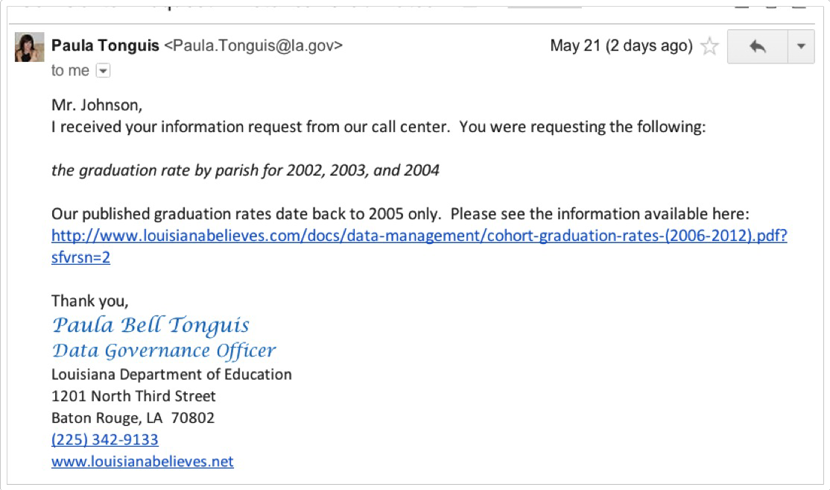
“Our Published Graduation Rates Date Back To 2005 Only.”
The link she provides is the same one Ms. Dreilinger directed me to on Educate Now! in her first response. A limp PDF that not only says nothing of New Orleans graduation rates before Katrina, it says nothing of rates immediately after – ignoring the greater New Orleans graduation rates altogether until 2010.
Indeed, U.S. Department of Education data corroborates that no such graduation data exist, omitting the entire state of Louisiana from the records of its 2003-2004 and 2004-2005 state-by-state graduation rates.
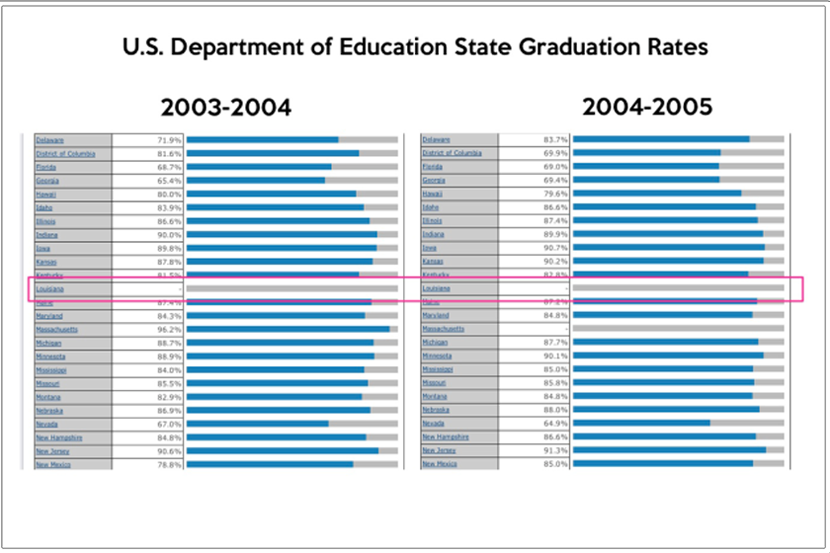
After The Fall
The “Opportunity” Narrative
The story of Katrina and how it justified charter schools can best be summed up by Arthur Miller’s observation that “the structure of a play is always the story of how the birds came home to roost.”
So went the Katrina reform school narrative in all its moral clarity. Circa 2005 charter school leaders, largely funded by the Walton, Gates, Koch families and given cover by neoliberal corporatists whose primary purpose appeared to be the act of looking busy, sought a PR coup. Though they were making incremental headway, there was little urgency to their cause. Two weeks after Katrina however, while 96% of corpses still remained unidentified and the Superdome had been reduced to a “toxic biosphere”, the story of how the birds had come home to roost was too good to pass up. Koch-funded and proto-Tea Party outfit FreedomWorks was the first to float this narrative on September 15th, both in the pages of the National Review and on their website, in an op-ed by Chris Kinnan.
There is a second rescue urgently needed in the terrible aftermath of Hurricane Katrina, and one that is long overdue: saving New Orleans school kids from their broken public-school system. The tragedy of the storm provides America with a golden opportunity.
Citing only Kinnan’s “statistics”, Milton Friedman followed suit ten weeks later in the the Wall Street Journal:
Most New Orleans schools are in ruins, as are the homes of the children who have attended them. This is a tragedy. It is also an opportunity to radically reform the educational system.
Even Ms. Jacobs chimed in six weeks after the storm
“It’s hard to find a silver lining from Katrina, but one silver lining is that the school board can start anew. And if any school district needs to start anew, it’s Orleans.”
And so the “opportunity” narrative was trial ballooned and accepted. It didn’t matter that Kinnan’s statistics were total bullshit or that Friedman had more or less written the same piece or that the whole thing smacked of right wing exploitation. What mattered then – as it does now – was the creation of an image, the image of a decaying, morally bankrupt education system beyond repair. That the only ones who could defend the status quo – or at least its core institutions of collective bargaining and democratically elected school administrators – were either too displaced, too poor, or too muted by tragedy wasn’t seen as subterfuge, it was praised as “a golden opportunity”.
Of course, New Orleans did have real problems. We know, for certain, two pre-Katrina Orleans Parish School Board members were convicted by the FBI for kickbacks. But considering Louisiana’s current, charter school advocating DOE is routinely over budget, ripe with fraud, mared by several shady, unaccountable charter schools, and has been accused – just as D.C. charter school zealot Michelle Rhee – of test score inflation and manipulation, its unclear whether the current culture of graft is less, merely deemphazised, or simply repackaged and made legal behind the opacity of corporate governance.
All of this is to say nothing of the core fallacy at the heart of the “choice movement”: the presumption of dichotomy. Schools going bad? Poverty’s not the problem, abject racism’s not at fault, underfunding is irrelevant (Louisiana spent $1,636 more in real dollars per pupil in 2012 than it did pre-Katrina). No, it has to be teachers’ unions and local school boards. Get rid of those and let slick PR firms, Ivy League idealists, and hedge fund real estate interest come in and do it right. A third option, or a fourth option or any cost-benefit was never discussed. Within 10 weeks of Katrina, while the state’s largely poor and African American diaspora were scattered throughout the Gulf states simply trying to stay alive – the Louisiana State Legislature called an emergency session, passing ACT 35 which, as even Tulane’s pro-school reform Cowen Institute acknowledged, radically changed the defintion of “failing school” from the flawed but objective criteria of having a state score of less than 60 to include any school that was below the state score median, which, at the time was 86.2. Put another way: the state assured itself that their own Recovery School Board would control, by definition, at least 50% of the state’s schools no matter what.
Overnight, 102 of the 119 locally control New Orleans schools, all primarily poor, all primarily black, were put under the pro-charter, primarily white state control. Not because they were “failing” – a school cannot “fail” to meet retroactive standards – but rather because they were vulnerable. No study issued. No ballot measure campaigned for. No discussion had. The corporate forces were too overwhelming, the liberal class too monied and distracted. The official history of a broken school system that was simply washed to sea, too convenient. And the truth – like the shiny new charter school system that emerged at its expense – was simply torn down and built again from scratch.
Special thanks to Diane Ravitch, the incomparable Naomi Klein and the fearless New Orleans-based bloggers Jason France and Mercedes Schneider whose work provided the moral, intellectual, and political scaffolding for this piece.
Adam Johnson is a freelance journalist; formerly he was a founder of the hardware startup Brightbox, inc. You can follow him on Twitter at @adamjohnsonnyc
This piece was reprinted by EmpathyEducates with permission or license. We thank the Author, Adam Johnson for his kindness, observations, research and what we believe invites further reflection and a more robust conversation, one that keeps waiting.











Leave A Comment